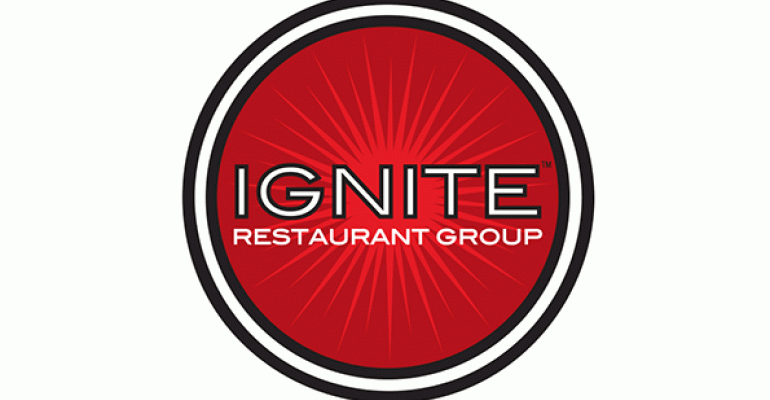 This post is part of the On the Margin blog.
This post is part of the On the Margin blog.
Has any restaurant acquisition caused as many problems as Ignite Restaurant Group Inc.’s 2013 purchase of Macaroni Grill?
Earlier this year, we called that deal one of the six worst restaurant acquisitions of all time, and for good reason. You can literally see, in company financials, how the Macaroni Grill deal destroyed Ignite, owner of Joe’s Crab Shack and Brick House Tavern + Tap.
This week’s bankruptcy at Ignite simply completed the destruction.
Ignite was a modestly profitable casual-dining operator when it went public in May of 2012, and in the subsequent weeks its stock price steadily increased thanks to good performance. Two months later, however, Ignite had to restate its financials, which in hindsight was a bad omen.
The company generated $12 million in net income in 2011, and $8.7 million in net income in 2012, and profits in each of the previous two years. Same-store sales had grown every year from 2008 through 2012. The company had reduced its debt levels, to $45 million in total debt at the end of 2012.
The next year, Ignite jumped on what it thought was an amazing deal: Buying Macaroni Grill from Golden Gate Capital for $55 million. Just a few years earlier, that company was valued at $131.5 million. At one point, Mac Grill had been a highly regarded name in the restaurant business.
Ignite felt that its operational abilities could turn that chain around. “We have a history of driving operational improvements at Joe’s Crab Shack and we believe we have identified significant opportunities and synergies that we will leverage over the next 12 months and beyond,” Ray Blanchette, Ignite’s CEO at the time of the sale, said in the deal announcement.
Here’s the problem: Ignite took on new debt the year it bought Mac Grill, and then refinanced with a $165 million term loan in 2014.
All that debt was taken on by a company with relatively few assets. All of Joe’s and Brick House’s locations are leased — complicating store closures and giving it nothing to sell in a downturn.
Ignite didn’t buy any property with the Mac Grill purchase, either. All of that chain’s locations were leased.
As such, the Mac Grill deal was based entirely on Ignite’s ability to turn the chain around so it could start generating profits.
That didn’t happen. Mac Grill was an unmitigated disaster. The chain’s sales were falling, and Ignite executives spent just about all of their time trying to turn it around.
“Quite frankly, I think we were a bit arrogant," Ignite CEO Ray Blanchette said during a 2013 earnings call. “And that's the piece that's a little embarrassing.”
Ignite didn’t keep the chain for long. The company sold Mac Grill just 18 months after the purchase for $8 million — or 14.5 percent of its purchase price.
But the acquisition cost Ignite much more than that.
The company began taking on water in 2013. That year, it lost $6.6 million. Losses ballooned to $53.5 million in 2014.
Indeed, the company’s losses since that ill-fated purchase of totaled $156.8 million.
Add that to the $47 million loss Ignite took on the Mac Grill purchase, and the total losses associated with that deal add up to $203.8 million.
We blame those losses on Mac Grill because once Ignite bought the chain, Joe’s Crab Shack, and then Brick House, began losing customers. Joe’s same-store sales, which had increased steadily for years, fell 4.9 percent in 2014 and another 4.5 percent in 2015.
Company executives themselves admitted that they took their eyes off Joe’s as they focused on Mac Grill. The sales declines and higher debt, coupled with a portfolio of leased spaces that can’t be sold off, took a steep toll.
Ignite lost its Nasdaq listing and began looking for a buyer. Just when it seemed the company had potential bidders, same-store sales fell off a cliff, plunging more than 14 percent at Joe’s in the first quarter. That’s hardly a surprise: Companies in survival mode often make drastic cost cuts to fix profits, which can turn off customers.
Buyers withdrew their bids. Robert Merritt, who took over for Blanchette in November 2015, resigned, and was replaced by Jonathan Tibus, the managing director at turnaround firm Alvarez and Marsal.
Tibus had also served as CEO of Last Call Operating Co., owner of Champps and Fox & Hound, which filed for bankruptcy last year.
Coincidentally, the company that has stepped in to potentially buy Ignite out of bankruptcy is Kelly Investment Group, is the same company that surprisingly bought Last Call a year ago.
Kelly’s offer price is $50 million. That’s much less than Ignite’s $133.3 million in secured debt.
Without that debt, and with bankruptcy potentially able to wipe out some bad locations, perhaps a new owner and new management team can turn around Joe’s Crab Shack and Brick House.
Or, perhaps more to the point, the bankruptcy will clean up the mess remaining from Ignite’s Macaroni Grill debacle.
Jonathan Maze, Nation’s Restaurant News senior financial editor, does not directly own stock or interest in a restaurant company.
Contact Jonathan Maze at [email protected]
Follow him on Twitter: @jonathanmaze





